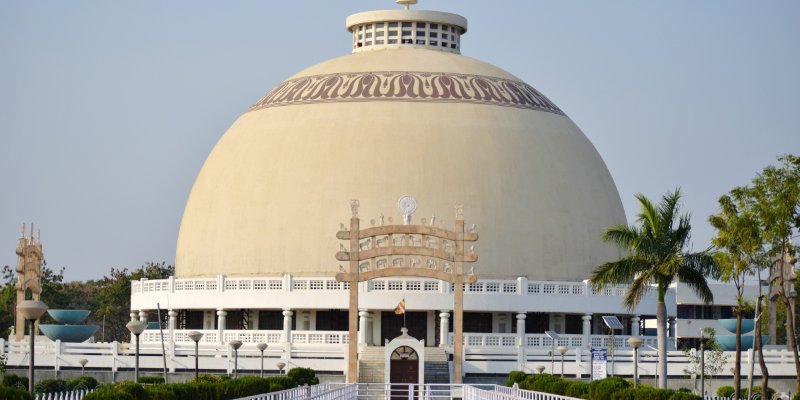Nagpur Unveiled: Your Comprehensive Travel Guide
Dec 25, 2023 By Sean William
Advertisement
Nagpur, a vibrant city in Maharashtra, India, combines history with modernity. Nagpur, known as the "Orange City," is known for its cultural diversity and numerous attractions. Orange farming in the area inspired the city's name, which reflects its agricultural success and gives color to its character. Nagpur's strength is its ability to blend history and modernity, producing a welcoming atmosphere for people and tourists.
Nagpur offers a rich tapestry of heritage, spirituality, and natural beauty. Dr. B. R. Ambedkar's conversion to Buddhism is commemorated at Deekshabhoomi, a majestic Buddhist stupa. This spiritual refuge invites pilgrims and history buffs, enriching Nagpur's culture. Nagpur has vibrant metropolitan areas and sophisticated attractions. The contrast between historic temples like Hedgewar Smriti Temple, dedicated to RSS founder, and Khekranala Reservoir shows the city's diversity. Nagpur's combination of history, spirituality, and natural beauty invites exploration of the past and present.

Popular Tourist Attractions in Nagpur:
Deekshabhoomi Nagpur
One of Nagpur's top attractions, Deekshabhoomi, symbolizes Buddhist renewal. The hallowed monument in the city center is where Dr. B.R. Ambedkar, the principal architect of the Indian Constitution, and thousands of supporters converted to Buddhism in 1956. Deekshabhoomi's stupa, with its exquisite carvings and rich flora, is a tranquil place to meditate. Visitors enjoy the peacefulness and history of this location.
Besides its spiritual importance, Deekshabhoomi conducts cultural events and festivals that draw people from all backgrounds. Annual Dhamma Chakra Pravartan Dins, celebrating Dr. Ambedkar's conversion, draws enormous crowds and demonstrates the site's cultural life. From spiritual consolation to historical understanding, Deekshabhoomi is a must-see in Nagpur for its unique combination of cultural and religious events.
SEWAGRAM
Sevagram, meaning "Village of Service," embodies Mahatma Gandhi's basic, self-sufficient lifestyle. Gandhi lived in this area in Wardha, a short drive from Nagpur, and the ashram was based there throughout the Indian independence campaign. The Mahatma Gandhi Museum at Sevagram Ashram displays his items and gives visitors a look into his life and beliefs.
The ashram's tranquility and simple architecture inspire introspection. Explore Gandhi's hut, the prayer ground, and the spinning wheel chamber at the ashram to learn about India's liberation fight. The living homage to Mahatma Gandhi makes Sevagram an instructive and spiritually uplifting trip for people interested in India's history and non-violence.
HEDGEWAR SMRITI TEMPLE
Hedgewar Smriti Temple honors Keshav Baliram Hedgewar, the founder of the RSS, a significant Indian socio-cultural organization. The temple at Reshimbagh, Nagpur, is a modern-traditional masterpiece. The temple complex's museum recalls Hedgewar's life and goals, revealing the organization's effect on Indian society.
The temple's tranquility and well-maintained grounds comfort Hedgewar devotees. The temple promotes culture and patriotism as well as religion. For those interested in modern India's socio-cultural fabric, Hedgewar Smriti Temple's unique blend of spirituality, history, and culture is worth seeing.
KHEKARANALA RESERVOIR
Khekaranala Reservoir, in the verdant hills of Saoner near Nagpur, is a beautiful escape from city life. Nature lovers, adventurers, and tranquility seekers visit the reservoir, surrounded by deep woods and stunning sceneries. The tranquil Khekaranala offers boating, walking, and bird viewing, making it a great outdoor vacation.
Explore the slopes, enjoy water sports, or rest by the quiet waterways. The reservoir's diverse vegetation and wildlife enhance its natural beauty. One of Nagpur's hidden jewels for nature and leisure, Khekaranala Reservoir is perfect for family picnics, solitary treks, and romantic getaways.
Balaji Temple Nagpur
Balaji Temple in Nagpur showcases the city's spiritual and architectural riches. Visitors marvel at the temple's grandeur and beautiful sculptures, which are dedicated to Lord Venkateswara, a manifestation of Lord Vishnu. The temple complex has many shrines to different deities and a magnificently decorated image of Lord Balaji in the sanctum sanctorum.
The temple's serene atmosphere and South Indian architecture attract devotees and visitors. Cultural activities, religious rituals, and festivals draw a diverse crowd to the temple. If you're looking for spiritual peace or beautiful temple architecture, Balaji Temple in Nagpur is a holy place.

Ambazari Lake Nagpur
Locals and tourists visit Nagpur's vast Ambazari Lake for entertainment and relaxation. The lake is surrounded by nature and walking routes, offering a pleasant escape from the city. Visitors may enjoy the lake's beauty and quiet via boat.
Well-kept gardens accentuate the lake's attractiveness, making it perfect for picnics and strolls. Cultural events and festivals draw thousands to Ambazari Lake for fun and recreation. Nature lovers and Nagpur residents alike love Ambazari Lake for its natural beauty and recreational opportunities.
Japanese Rose Garden Nagpur
Nagpur's Japanese Rose Garden is a flowery oasis in the city. The Nagpur Municipal Corporation and the Japan-India Friendship Forum collaborated on the Civil Lines garden, which blends Japanese landscaping with Indian flower varieties. The garden's roses are carefully organized in themed areas, delighting visitors.
Visitors may wander along well-maintained paths to see roses and other attractive flora. The garden's peacefulness and well-designed arrangement make it perfect for photography, walking, and relaxing in nature. The Japanese Rose Garden is a lovely and refreshing experience for botany lovers, nature lovers, and Nagpur residents seeking a tranquil retreat.
Hotel Woodlands Nagpur
Hotel Woodlands in Nagpur offers peace and comfort. The well-appointed apartments provide a calm respite after a day of sightseeing or business. Hotel Woodlands strives to make every aspect of the stay unforgettable. The on-site restaurants offer a gourmet adventure that tantalizes the taste senses.
Hotel Woodlands is known for its commitment to tranquility in the city. The hotel's lush vegetation and meticulous landscaping provide a pleasant respite. Hotel Woodlands blends luxury and convenience, whether relaxing in the lovely rooms, dining in the restaurant, or exploring Nagpur's attractions. It's a place to unwind and experience Nagpur's finest.
Best Time to Visit in Nagpur:
The choice of the ideal time to visit Nagpur relies on personal tastes and desired experience. Winter, from October to February, is best. The weather is comfortable, from 10 to 25 degrees Celsius, making it suitable for outdoor sports and exploration. A rich and immersive experience awaits tourists as the city comes alive with festivals, cultural events, and colorful marketplaces.
Winters are famous, but others prefer Nagpur's rich greenery and lower temperatures in the monsoon season from June to September. Nature lovers appreciate the refreshed environment after the rain. However, sometimes severe rain and transport inconveniences must be anticipated. March to June summers might reach 40 degrees Celsius, making outdoor activities less enjoyable. Plan your Nagpur visit during colder months to maximize your time.
How to Reach Nagpur
The major central Indian city of Nagpur is well-connected by many kinds of transportation. Dr. Babasaheb Ambedkar International Airport in Nagpur is a central transportation hub with local and international flights. Nagpur Junction Railway Station connects vital cities nationwide. Trains provide picturesque routes and are ideal for touring India.
Buses and cars may reach Nagpur via its well-developed national and state highway network. Nagpur has frequent governmental and private bus connections to adjacent cities and states. Nagpur's central position makes it a good road trip destination. The ideal method of transportation for your itinerary and comfort depends on your location and travel preferences.
Conclusion:
In conclusion, Nagpur is beautiful year-round, but winter is the best time to come for its lovely weather and exciting cultural festivals. Monsoon season is gorgeous but demands preparation for heavy rains, while summers bring high heat. Nagpur's culture and history draw visitors year-round.
Nagpur's air, train, and road connections make travel easy. Gateways like Dr. Babasaheb Ambedkar International Airport and Nagpur Junction Railway Station suit varied travel preferences. However, travelers should be careful of local weather, respect cultural customs, and arrange their trips around severe season interruptions. Explore Nagpur's unique history, wildlife, and lively culture for a rewarding experience.
Advertisement
-
![]() Guides
GuidesExploring Portugal's Stunning Islands: A World Apart
Juliana Daniel Feb 20, 2024
-
![]() Destinations
DestinationsCelebrating American Culture: Key Festivals Reflecting National Heritage
Juliana Daniel Feb 22, 2024
-
![]() Guides
GuidesChennai to Tirupati Road Trip: Everything you need to know!
Sean William Jan 03, 2024
-
![]() Travel Tips
Travel Tips6 Dutch Traditions Every Traveler should know
Sean William Feb 25, 2024
-
![]() Travel Tips
Travel TipsMaximizing Your Kochi Visit: Top Things to Do
Sean William Feb 20, 2024
-
![]() Destinations
DestinationsKnow AboutAtmantan Wellness Resort, Mulshi
Juliana Daniel Nov 12, 2023
-
![]() Attractions
AttractionsExplore Kashmir's Stunning Scenery and Hidden Gems
Juliana Daniel Jan 10, 2024
-
![]() Destinations
DestinationsTop 8 Most Exciting Festivals and Events in India You Can Participate in 2024
Sean William Dec 26, 2023







